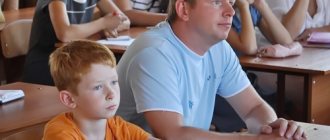Parent meeting “Implementation of Federal State Educational Standards in preschool educational institutions” methodological development on the topic
MKDOU kindergarten "Beryozka"
Parent meeting on the topic:
"Implementation of Federal State Educational Standards in preschool educational institutions"
(Federal state general education standard in preschool educational institutions)
The performance is accompanied by a presentation.
Goal: to familiarize parents with the features of constructing the educational process at the first stage of preschool education in accordance with the requirements of the Federal State Educational Standard of Preschool Educational Institution.
Tasks:
- give an idea of what the Federal State Educational Standard is;
- during presentation work, illustrate to parents the advantages of an activity-based approach to education and training;
- Show parents a presentation of the benefits.
Dear parents
— Today we will talk to you about the program for implementing the Federal State Educational Standard in preschool educational institutions
What is the Federal State Educational Standard? What is a standard? How does FGT differ from Federal State Educational Standards? And why is it called the “Second Generation Standard”?
— Unlike other standards, the Federal State Educational Standard for preschool education is not the basis for assessing compliance with the established requirements of educational activities and training of students. The development of educational programs of preschool education is not accompanied by intermediate certifications and final certification of students.
The standard aims to achieve the following goals:
- 1) increasing the social status of preschool education;
- 2) ensuring by the state equal opportunities for every child to receive quality preschool education;
- 3) ensuring state guarantees of the level and quality of preschool education based on the unity of mandatory requirements for the conditions for the implementation of educational programs of preschool education, their structure and the results of their development;
- 4) maintaining the unity of the educational space of the Russian Federation regarding the level of preschool education.
Why is the Federal State Educational Standard for preschool education needed?
-The standard for preschool educational institutions is a requirement of the new education law, in which preschool education is recognized as a level of general education. Until today, the Federal State Requirements (FGT) for preschool education were in force, which consisted of two parts: requirements for the structure of the main educational program of preschool education and requirements for the conditions for its implementation. The standard will include requirements for results, but this does not mean that kindergarten graduates will have to take exams! There will be no final certification; this is the norm of the law. At the same time, with the help of monitoring studies at different stages, it is possible and necessary to record the level of development of the child, so that teachers of preschool institutions and parents understand what to work on next. Attention to the standard will be more intense, because preschool childhood is that period of a child’s life when the family shows maximum interest in him.
The Federal State Educational Standard includes requirements for:
- the structure of the main educational programs (including the ratio of the compulsory part of the main educational program and the part formed by participants in educational relations) and their volume;
- conditions for the implementation of basic educational programs, including personnel, financial, logistics and other conditions;
- results of mastering basic educational programs.
Program
Educational activities - 60%.
Additional activities -40%.
What new things await preschool education in the near future? Firstly, a preschool educational institution from a child’s “storage room” actually turns into an educational organization in which the implementation of the main educational program of preschool education is accompanied by the supervision and care of pupils, including the organization of their meals and daily routine.
Secondly, all children of preschool age should be provided with the opportunity to receive preschool education.
Thirdly, fees are charged to parents (legal representatives) for supervision and care of the child. The educational program is provided free of charge.
The difference is fundamentally visible. It is based on an activity approach; the child learns the world through activity.
Activity should become the basis of a child’s learning, i.e. get away from the monologue of the teacher and come to the point where the child becomes independent. In other words, he obtains knowledge for himself.
The teacher only accompanies the child during the first lesson (educational activities). The preschooler should feel like he is in control of what he can answer, when to answer, and how to answer. In other words, there is no stiffness. We don’t force people into a certain framework, we let everyone express themselves.
This does not mean that we are not engaged. We educators are involved in the development of the child, we know all his physiological characteristics, but do not demand that the child read and write. They will be taught all this at school.
The new document prioritizes an individual approach to the child and play, where the intrinsic value of preschool childhood is preserved and where the very nature of the preschooler is preserved. The fact that the role of play is increasing as the leading activity of a preschooler and that it is given a dominant place is certainly positive. The need to abandon the educational and disciplinary model of the educational process - the abandonment of specially organized activities - is long overdue. The leading types of children's activities will be: gaming, communicative, motor, cognitive-research, productive, etc. It should be noted that each type of children's activity corresponds to certain forms of work with children.
The content of the main program includes a set of educational areas that will ensure the comprehensive development of children, taking into account their age
- Social and communicative development
- Cognitive development
- Speech development
- Artistic and aesthetic development
- Physical development
Educational areas have been introduced to maintain a balance between all areas of the kindergarten's work - all of them should be equally represented in the educational program of preschool education.
Target guidelines for preschool education:
- The child’s initiative and independence in various activities;
- Curiosity;
- The ability to choose one’s occupation and participants in joint activities;
- Self-confidence, openness to the outside world, positive attitude towards oneself and others, self-esteem;
- Developed imagination, ability for imagination, creativity;
- Ability to obey different rules and social norms;
- Developed gross and fine motor skills;
- The ability to exert volition in various types of activities.
If we talk about what is fundamentally new in the content of preschool education, then this is the obligation of its compliance with the principles stated in the Federal State Educational Standard:
- supporting childhood diversity; preserving the uniqueness and intrinsic value of childhood as an important stage in the overall development of a person, the intrinsic value of childhood - understanding (considering) childhood as a period of life that is significant in itself, without any conditions; significant because of what is happening to the child now, and not because this period is a period of preparation for the next period;
- the personal developmental and humanistic nature of interaction between adults (parents (legal representatives), teaching and other employees of the Organization) and children;
- respect for the child's personality;
- implementation of the Program in forms specific to children of this age group, primarily in the form of play, cognitive and research activities, in the form of creative activity that ensures the artistic and aesthetic development of the child.
The document focuses on interaction with parents: parents must participate in the implementation of the program, in creating conditions for the full and timely development of the child in preschool age, so as not to miss the most important period in the development of his personality. Parents should be active participants in the educational process, participants in all projects, regardless of what activity dominates them, and not just outside observers.
“And what is also very important, the basic preschool education program ensures continuity with the exemplary basic primary education programs, which was not the case before.
As a result of the measures taken, the organizational and legal form of preschool institutions should change, and a sector of autonomous non-profit organizations should be created. It is planned that private preschool organizations will develop. The introduction of a normative per capita payment mechanism for services will give parents the opportunity to choose between municipal and private institutions and organizations providing preschool education services. Stimulating competition in preschool education and introducing a municipal order system for preschool education services will bring to the fore the quality of educational services, which will directly depend on each kindergarten’s understanding of its place in the system of lifelong education.
Requirements for a developing subject-spatial environment: — Content richness
— Transformability
— Multifunctionality
— Variability
- Availability
- Safety
Requirements for financial conditions
Financing in an amount not lower than the standards determined by the state authorities of the constituent entities of the Russian Federation:
- labor costs
— expenses for educational and educational means (educational publications, didactic, audio and video materials, special clothing, games and toys, sports and recreational equipment, communication services including the Internet)
— expenses associated with additional professional education of management and teaching staff.
The prospect of reforming preschool education gives hope for qualitative changes in this area. An attempt is being made to transform the once unified system of “public preschool education” into a genuine system of preschool education as a full-fledged and integral stage of general education. This means the actual recognition that a preschool child needs not only guardianship and care, but also education, training, and development.
Thus, new strategic guidelines in the development of the education system should be perceived positively. Firstly, the preschool education system must develop in accordance with the demands of society and the state, which are promulgated in this order. Secondly, there are many positive things in the order:
- The desire to make life in kindergarten more meaningful and interesting.
- Creating conditions so that the teacher can take into account the characteristics of development, the interests of his group, the specifics of the national, cultural and natural geographical conditions in which the educational process is carried out, and much more.
- An attempt to influence the reduction and simplification of the content of education for preschool children by establishing targets for each educational area.
- The desire to form an initiative, active and independent child.
- Refusal to copy school technologies and forms of educational organization.
- Focus on promoting child development when interacting with parents.





